-
Paper Information
- Paper Submission
-
Journal Information
- About This Journal
- Editorial Board
- Current Issue
- Archive
- Author Guidelines
- Contact Us
International Journal of Library Science
p-ISSN: 2168-488X e-ISSN: 2168-4901
2019; 8(1): 7-17
doi:10.5923/j.library.20190801.02

Environmental-Friendly Customer Relation Approaches to Resolving Low Patronage in Academic Libraries: Perspective and Preferences of Student-Users
Williams T. Saibakumo1, Flora Orewa2, Lawrence O. Nwose3
1Cataloguing and Classification Section, University Library, Delta State University, Abraka, Delta State, Nigeria
2Delta State University, Oleh Campus, Delta State, Nigeria
3Polytechnic Library, Delta State Polytechnic, Ogwashi-uku, Delta State, Nigeria
Correspondence to: Williams T. Saibakumo, Cataloguing and Classification Section, University Library, Delta State University, Abraka, Delta State, Nigeria.
| Email: |  |
Copyright © 2019 The Author(s). Published by Scientific & Academic Publishing.
This work is licensed under the Creative Commons Attribution International License (CC BY).
http://creativecommons.org/licenses/by/4.0/

Purpose: Customer relation (CR) services in universities libraries are not as productive as expected especially with the advent of technology in Nigeria. Thus, the aim of this study was to examine levels of impact of some newly adoptable and available CR approaches that could possibly facilitate students’ patronage in academic libraries in Nigeria in this technology age from the opinion of students. Methodology: The descriptive survey design was adopted using 320 randomly selected student-users of academic library. A semi self-structured and interview-based constructed questionnaire was used. Descriptive and inferential statistics was used to draw inferences, interpret data and discuss the perspectives of the students. Findings: Time, space, lack of manpower and low levels of satisfactions were observed in the academic libraries to pose a threat to its patronage by students while the use of social media platform, creation of dynamic interactive websites, extension of library open hours, hybridization of the traditional library, e-library and internet, the use of rapid response feedback system and e-mailing services for student inquiry and queries can resolve the low patronage experienced by academic libraries in the technology age. There is the possibility of reaching out to a larger population of student patrons through the provision of a call centre, an interactive dynamic and remote access to library repository. Creating or increasing awareness on services offered in the libraries, marketing products and services can potentially attract more patronage from other users and co-operate bodies by 3%. Research Limitation: The paper sourced information from the immediate environment of the authors which is a single state and its findings and discussion are addressed within the confines of the scope covered, thus cannot be used to generalise in terms of conclusions for other areas uncovered. Social/Practical Implications: Considering the adoption of these new approaches will productively improve academic library performance and patronage where students are the dominant patrons. Originality: The paper x-rays the perspective of student users of academic libraries in Delta State on certain new approaches that have been advocated for by some librarians and tried to ascertain the extent to which this can be of use to them.
Keywords: Library patronage, Customer-friendly approach, Academic libraries, Students-perspective, Nigeria
Cite this paper: Williams T. Saibakumo, Flora Orewa, Lawrence O. Nwose, Environmental-Friendly Customer Relation Approaches to Resolving Low Patronage in Academic Libraries: Perspective and Preferences of Student-Users, International Journal of Library Science, Vol. 8 No. 1, 2019, pp. 7-17. doi: 10.5923/j.library.20190801.02.
Article Outline
1. Introduction
- In recent time, the advancements and ground breaking achievements in technology has stimulated the much ballooned advocacy on the expansion of academic library services in tertiary institutions (Ritterbush, 2014; Brian, 2015; Ream & Parker-Kelly, 2016; and Chen et al., 2017). This is tentatively targeted at meeting the growing research/academic information needs of students and other users of academic libraries. In time when budgetary allocations for academic libraries are fast declining and remote access to information on the Internet that is now available to many taking over. Libraries need to adopt new approaches in their services to tackle the issue of patronage. This ever changing wind of technological innovation and creative advancement is causing academic libraries to braze up with the trends in other to stay extant. Understanding academic library sustenance techniques is pivot to its continual existence and relevance in the present digital society. One of such ways according to Earl (2017) is to train librarians and other library staff on digital service and regular update on research services. Keeping up with the trend in the communication technology is crucial to the functionality of information professionals in the society. This probably prompted the extension of library services to online students and distant learners to overcome the issue of physical distance (Ritterbush, 2014).The reduction in stocked books and the library without walls concepts have redefined the use pattern of academic libraries (Tait et al., 2016). With the increasing number of students from the growing population of people been admitted, academic libraries thus need a fair playing ground for all student users of the library to be able to fully access the facilities available. Saibakumo (2018) proposed a conceptual framework on the connection between some expanded services and how it can benefit its users (see Figure 1). He opined that incorporating the internet, technology or social media into the library for effective service provision in view of improving customer relation is pertinent to library growth. He conceptualised that all classes of library users will benefit from this initiative. Very recently, Siregar and Dewiyana (2018) averred that there is a high demand for a fast, reliable and easier strategy to obtaining and sharing information and its rapidly increasing among library users. One of the ways of doing this is through mobile technology, to improve access to library resources, services, bridge communication gap between staff and students, and finally enhance the quality of services provided in the academic library.
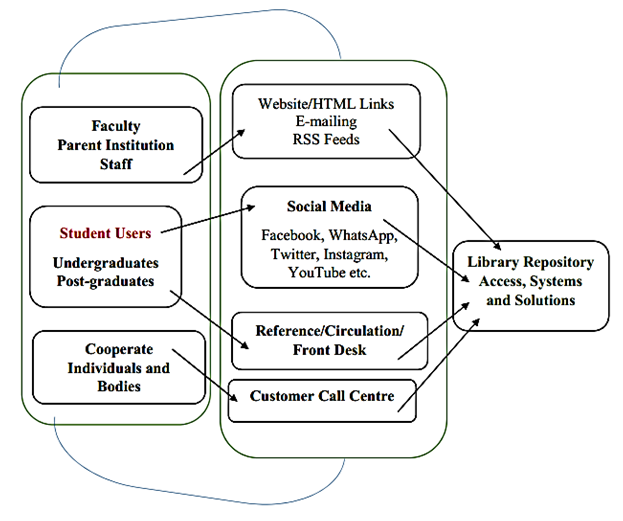 | Figure 1. Conceptual model (adapted from Saibakumo, 2018) |
1.1. Aims and Objectives
- 1. Find out the significant challenges with students’ use of academic libraries2. Identify adoptable practices to encourage library customer relations3. Ascertain students perception on these essential approaches4. Know the extent these new adoptable services and approaches can impact their use of library
1.2. Research Questions
- 1. What are some of the challenges with students’ use of academic libraries?2. Which adoptable practices can encourage library customer relations and use?3. Could there be any relevance of these approaches to the academic libraries by the students’ perception?4. To what extent these new adoptable services and approaches can impact students use of library.
1.3. Hypothesis
- HO1 (null): There is no significant contribution of these new adoptable library services to students’ use of libraries.HA2 (alternate): There is a significant contribution of these new adoptable library services to students’ use of libraries.
2. Research Method
- Design: The study is quantitative, adopted a survey design and was carried out in Delta State, Nigeria using academic libraries in state, private or government own tertiary institutions. The choice of research on this field of library and information science was informed by personal observations of author, complaints from students mostly from the Delta State, Nigeria and from a pilot survey of students in campuses. Sample and sampling technique: Three hundred and twenty (320) students were randomly selected from five (7) institutions (Delta State University, Abraka, Federal University of Petroleum Resources, Effurun, Western Delta University, Oghara, Novenna University, Ogume, Federal College of Education (Technical), Asaba, Delta State Polytechnics, Ozoro and Ogwashi-uku) out of 14 government approved tertiary institutions. These institutions were strategically and purposively selected to cover the three senatorial districts and types of tertiary institutions operational in the state. Research Instrument: The research instrument was developed via a review of literature (Saibakumo, 2018) and a semi-focal group interview with students by author concerning the subject. From a list of possible items that made up the instrument, respondents were requested to indicate their opinion by ticking any of the four point Likert scale of strongly agree to strongly disagree corresponding with the points, 4 to 1. Data Analysis: The criterion mean of 2.5 was set to ascertain the level of acceptance of an item responded to and statistical means in their increasing order of magnitude was used to ascertain the most preferred approaches as found in the instrument for data collection. Data were analysed using descriptive statistics such as percentages, frequency counts, means, and standard deviation. For the hypothesis to be tested, inferential statistics using the Multiple Regression Analysis with the IBM SPSS version 21 was used. The confidence interval was set for 95%.
3. Results
- The numbers of returned questionnaires were two hundred and ninety eight (298), however, only 264 was found useful for analysis making the return rate to be 82.5% and deemed statistically acceptable for broader interpretation of results. Tables 1 – 6 shows the results as retrieved from respondents. From Table 1, it can be observed that male respondents were more than the females however; both gender classes were adequately represented. Respondents that were single was more (N = 125, 47.7%) than other marital status present, although no respondent indicated that he/she is widowed, but 6.4% were found to be divorced. Most of the respondents were from 300 level (N= 106, 40%), which is penultimate for most level of study for most departments in tertiary institutions for the four-years programmes, and this was followed by those from 200 level (N = 64, 24%) and 400 level (N = 34, 13%). It was found that no 600 level student responded which are mostly professional courses/departments. More (N = 207, 78%). Christians were found in the study than their Muslim counterparts (N = 34, 13%) probably because the region of study is mostly dominated by Christians. The age ranges of the respondents were predominantly 21 – 27 years (N = 208, 79%), 14 – 20 years (N = 33, 12%) with 35 years and above least (N = 10, 4%). Generally a fair distribution of demographic information was observed.
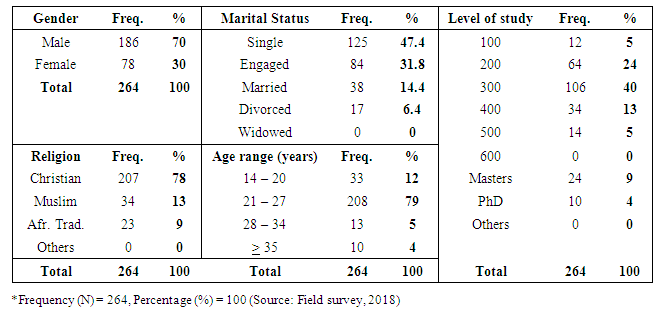 | Table 1. Demographics of respondents |
3.1. Answering Research Question
- RQ 1: What are some of the challenges with students’ use of academic libraries? The question was answered in Table 2 below. The challenges with the use of library was analysed in Table 2 and using a criterion mean of 2.50, it revealed that there is inadequacy in manpower (t = 62.95, mean = 3.11, stdev = 0.91), low level of satisfaction with the services provided by the academic libraries (t = 62.89, mean = 3.03, stdev = 0.78), sometimes the attitude of staff (cf. junior staff as inferred from interview with some students) was seen a challenge especially when they visit the library for enquiry (t = 50.52, sig. = 0.000, mean = 2.64, stdev = 0.85) and the noise generated by some staff and student users in the library could be disturbing at some point (t = 53.15, mean = 2.98, stdev = 0.91). Although, responses for availability and use of outdated technology (t = 38.46, mean = 2.29, stdev = 0.97) and lack of information expertise (t = 39.38, mean = 2.26, stdev = 0.93) and were found not to be factors that hinder library use alongside with the generalisation that the libraries has poor customer management pattern (t = 38.01, mean = 2.42, stdev = 1.04) among others as shown in Table 2. However, the pool mean of 2.62 and standard deviation (stdev) of 0.93 showed that the challenges pointed out by students were possible indicators of their low patronage of the academic libraries.
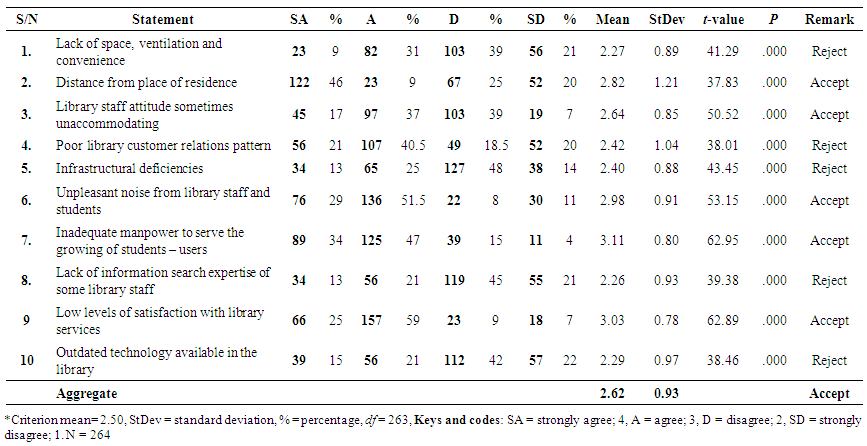 | Table 2. Challenges with students’ use of academic libraries in Delta State |
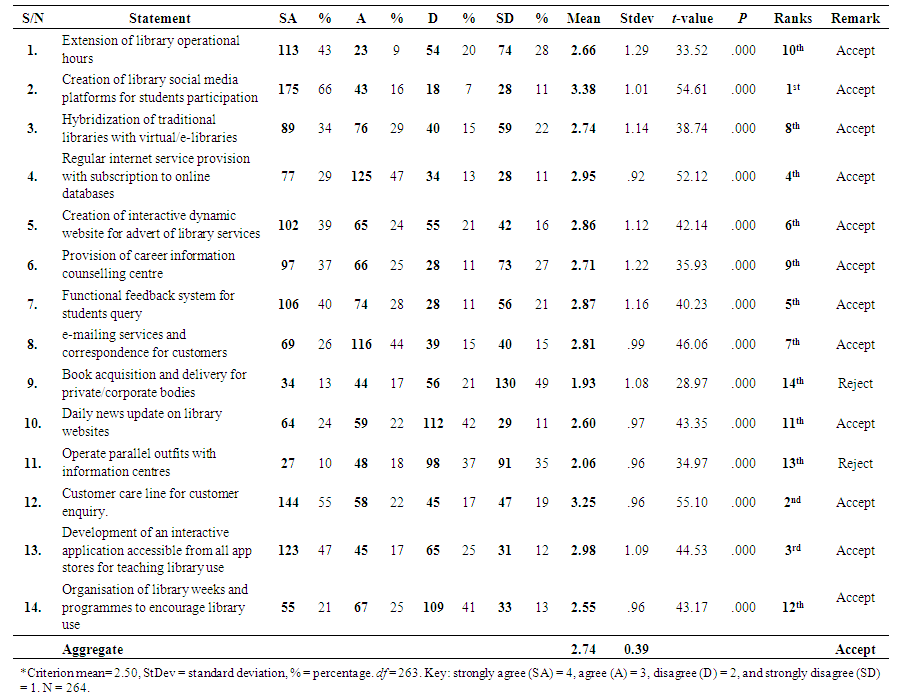 | Table 3. New practices to encourage library patronage |
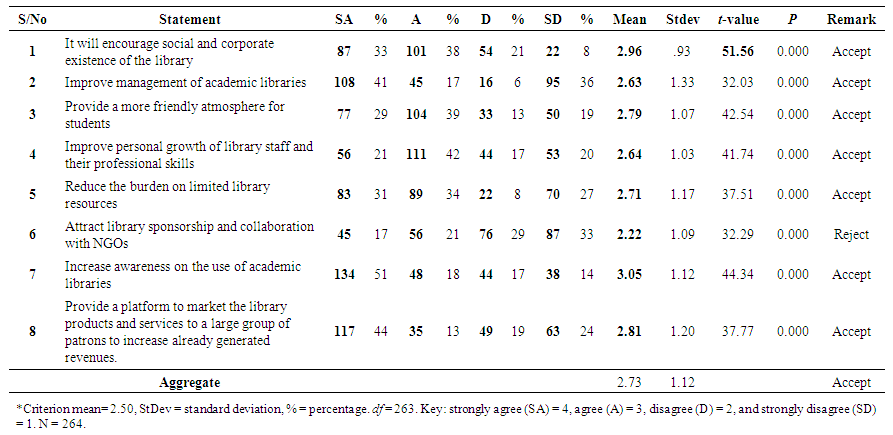 | Table 4. The relevance of these essential approaches to academic libraries |
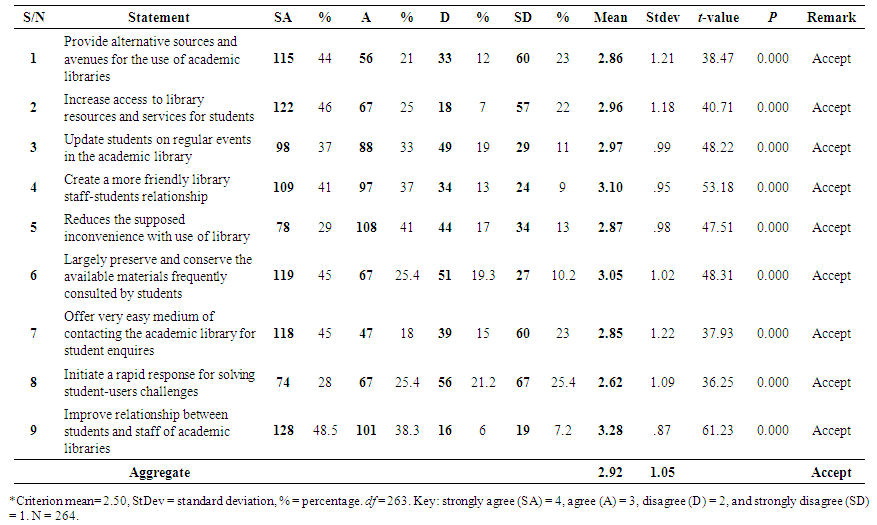 | Table 5. The extent these new adoptable services and approaches can impact the use of library |
3.2. Testing Hypothesis
- HO1 (null): There is no significant contribution of these new adoptable library services to students’ use of libraries. The hypothesis was tested in Table 6 below. Table 6 showed that the new adoptable methods for providing library services can contribute 3.0% improvement (R2 = 0.030) and is positively correlated (r = 0.144). The relationship between library service provision and the importance of these new adoptable methods is also significant (F = 8.176, sig. = 0.005). This could mean that services can be better offered and patronage by students can be enhanced once these methods are inculcated into the daily operations of the academic libraries. The standardised coefficient (β = 0.174, t = 21.570, sig. = 0.000) further reveals its importance to library services as they were found to be positive and highly influential.
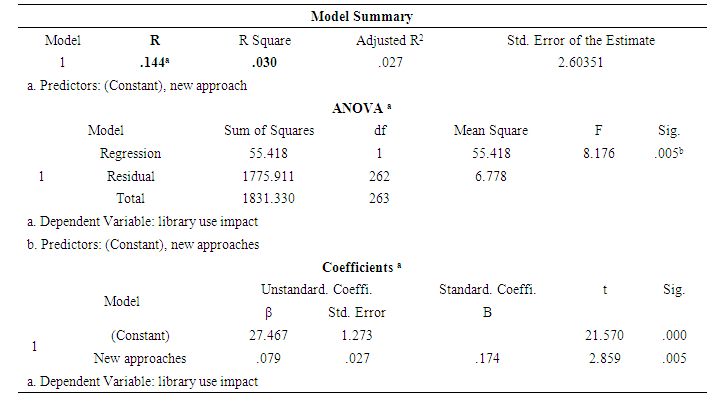 | Table 6. Relevance of new adoptable methods to academic library patronage by students |
4. Discussion
- The level of satisfaction with the use of academic libraries is pertinent to its existence, continuity and the relevance placed on it by student-users (Ikenwe & Iwari-Idowu, 2014). The overall low level of satisfaction as revealed in the study, which was also report by Shabi et al. (2016) on the use of National Libraries could be probably due to the little attention given by staff on proper human relation techniques as some of them were found to be non-courteous, very slow in responding to users query and inquiry. One of the characteristics of the millennia otherwise called the new generations in the technology era is impatience and instant gratification which may have contributed this low level of satisfaction with the services provided by the academic libraries in this digital era. Library services that are time conscious will definitely wear off patrons. Although, a few other attributes have been pointed out earlier, but the issue of impatience must be looked at by libraries. Nnadozie (2017) also found that faculty are also not satisfied with services in academic libraries. These findings substantiate the perspectives of students from southern Nigeria on the unaccommodating behaviour of some staff when they visit the library. They advocated good customer relationship management by reducing noise and distractions in libraries and create a friendlier and accommodating environment. This ideology connects with the assertions of Olise and Okonji (2018) on the integration of traditional library into the Internet for a better marketing of the library to a larger population. This of course will improve the interaction of students and faculty with library staff.Students opined that the infrastructure currently available in academic libraries are adequate in line with Ijiekhuamhen et al. (2015), space and conveniences in the academic library do not pose a threat to its use. It cannot be over stressed at this point that academic libraries in Nigeria are constantly updating their infrastructure; however services still need a critical look. They (students) pointed out that extending the hours academic libraries are open is essential to the patronage of the library. Vividly, some academic libraries have adopted this method to encourage the student’s use of library for example, the Kenneth Dike Library of the University of Ibadan and the Delta State University, Abraka, just to be precise. Harrison et al. (2017), and Dickson and Holley (2010), advocated that the use of social media in academic libraries can establish a stronger link between student users and library management. In Nigeria, social media have become a faster means of information dissemination, while some have started holding meeting and classes on social media. Its relevance has grown over time and academic libraries are beginning to adopt its use in service delivery (Steiner, 2012; Adekunle aand Olla, 2014; Nduka, 2015). Collins and Quan-Haase (2012) and Fiander (2012) said social media supposedly promote the use of library services by students and other patrons emphasing the fact that its popularity and application in various aspect of the society may have prompted this advocacy for its complete adoption in academic libraries. It will definitely encouraged the use of social media as the technology brings the users closers to the library and facilitate knowledge sharing between students and staff of academic libraries (Waddell et al. 2012; Ellis and Pena, 2015). The creation of separate library websites will encourage virtual or remote visit to the library (Shakeel-Ahmed & Vinayagamoorthy, 2013). Namara (2010) averred that the website can publicise products and services of the library. The effect of globalisation have made remote access to resources easy, hence, academic libraries will benefit from this form of publicity. Websites can host a range of resources and potentially serve as a marketing agent for the library.Information professionals must be constantly aware of the vicissitudes associated with the information needs of customers of the library and that the improvement in the quality of services is also pivot to patronage (Kumar, 2013). The use of library guide on how to consult information through an online or offline technology and organising a workshop will enhance the patronage of academic libraries (Ijiekhuamhen et al. 2015) which had become the plea of students. In most organisations, applications have been self-instructional developed and this is common in the communications industry, banking sector and public firms. Programmes and workshops on the use of library could be impactful since the medium creates a better customer-library relationship and exposes them to the staff members of the library. The challenges with time, distance, attitudinal delinquencies of some staff and library open hours could be easily resolved if the library can be assessed remotely of its resources, events, and services via medium like OPAC (open public access catalogue), a technology-driven technique for assessing the store house of a library (Emiri, 2018). It can improve services offered in academic libraries and help to overcome the burden of looking through a voluminous set of print media, text and materials search in traditional catalogues and cabins in the library.There are clear indications that the use of software, the Internet, and online applications, there could reduce the rate at which papers are printed to guide instructions and notices to students, which can now be replaced through online forums, e-mail correspondence that can be done at any hour of the day once there is network access. This is an environmental friendly practice encourage today in organisations in Nigeria, although with ethical concerns and controversy of claims that paperless (e-media) is not better than print considering several other factors in play in the production process (Moodie, 2014). Within the context of this study and geographical area in view, printing papers is not environmental friendly since recycling models are not yet in place and not stringent law guard against indiscriminate disposal of papers, thus, the use of e-media in the dissemination of information to library users has proven effective and efficient. Cochrane (2017) feels it is more cost-effective and economical to go paperless as it save trees (deforestation), reduce pollution, save water and time. Thus, the use of e-media can better the use of library by students.Giving out the best in services can boost the influx of clients to an organisation (Qasim and Asadullah, 2013) even as they strive to market their products and services. Loligon et al. (2015) likened academic library as a business place where customers are on/at the top list of priority of the organisation, therefore their satisfaction is paramount to the existence of the organisation. Leveraging on certain practices that will encourage customers and overall patronage is the pivot upon which the organisations anchor on. Academic libraries management are encouraged to devote their resources to build their patron database, staff competence and enhance performance for their parent institutions. Onuoha and Subair (2013) and Ani et al. (2016) averred that the low ICT competence levels of staff of academic libraries is one of the constraints with its 21st century technology based applicability resulting to low patronage from students. Corporate responsibility of library management and parent institution is needed to achieve high patronage of academic libraries.
4.1. Practical/Social Implications
- The following practical or social implications were put forward following the findings of the study1. Academic libraries are to consider an implementation of new approaches to improving customer relationship especially student users who are biggest patrons of academic libraries.2. The effectiveness in services provided in academic libraries can be enhanced if technology is integrated with current realities of social media and internet among students and3. Adopting these techniques will reduce cost of library management.
5. Conclusions and Recommendations
- Conventional service provision in academic libraries is fast degrading as the emergence of technology and globalisation is impacting the traditional libraries. One of the tenets of library use is the people and the technology that drives the patterns of patronage of the libraries. The present survey has provided some useful insight into how services can be improved upon in academic libraries using various methods and capitalising on the power of 21st century technology available to academic libraries. Based on the results obtained from data collected from student-users of libraries, a number of academic libraries can actually maximise the internet in the creation of websites and regular feeds to users through e-mail services, use social media for group decisions and ready update on library matters to students. In supplementing for the challenges with regular dishing of instructions to students on the use of libraries, a simple interactive application can be created and made accessible for students amongst others. This will improve collaborative working pattern of library staff and effective service provision for students who use the library. It will help overcome the issue of spaces and time in visiting libraries as the very flexible websites would give up-to-date information on current topics and issues bordering around academic libraries. It is then recommended that, libraries and their staff must ensure that ICT compliance strategies should be adopted while budgetary allocations are to be provided for libraries for adopting these new approaches. The professional training and development of staff is also needed for these approaches to be utilised effectively.
ACKNOWLEDGEMENTS
- The authors are very grateful to all the persons who supported this research most especially Patience U. Otolo (Ph.D) for proofreading this manuscript and making relevant corrections. The authors are also thankful to Sylvester Onoride OBIGBA for his statistical input and analytical expertise.
Appendix
- RESEARCH INSTRUMENT
 The University Library,
The University Library, Delta State University,
Delta State University,  P.M.B. 1, Abraka,
P.M.B. 1, Abraka,  Delta State
Delta State June 23, 2018Dear RespondentRESEARCH QUESTIONNAIREThis questionnaire is in aid of a study on the students’ perception on some new adoptable services that will improve students’ use of traditional academic libraries in tertiary institutions in Delta State. To this effect, you have been tentatively selected to be a respondent to the research instrument. Please respond to the questions to enable me successfully complete the study. All information volunteered will be treated with utmost confidentiality and the anonymity of the respondent, guaranteed.Yours sincerely,SAIBAKUMO et al.Librarian / ResearcherSECTION A: Demographic DataInstruction: Please tick (√) when necessary and fill in appropriate sections1) Gender: Male [ ] Female [ ]2) Marital status: Married [ ] Engaged [ ] single [ ] divorced [ ] widowed [ ]3) Religion: Christian [ ] Muslim [ ] African traditional religion [ ] others [ ]4) Age range (years): (a) 14 – 20 [ ] (b) 21 – 27 [ ] (c) 28 – 34 [ ] 35 and above [ ]5) Level of study: 100 [ ] 200 [ ] 300 [ ] 400 [ ] 500 [ ] 600 [ ] Masters [ ] PhD [ ] others please specify………………………………………………SECTION B: challenges with students’ use of academic librariesInstruction: Please indicate the perception on the by ticking in the appropriate box using the key; strongly agree (SA) = 4, agree (A) = 3, disagree (D) = 2, and strongly disagree (SD) = 1.
June 23, 2018Dear RespondentRESEARCH QUESTIONNAIREThis questionnaire is in aid of a study on the students’ perception on some new adoptable services that will improve students’ use of traditional academic libraries in tertiary institutions in Delta State. To this effect, you have been tentatively selected to be a respondent to the research instrument. Please respond to the questions to enable me successfully complete the study. All information volunteered will be treated with utmost confidentiality and the anonymity of the respondent, guaranteed.Yours sincerely,SAIBAKUMO et al.Librarian / ResearcherSECTION A: Demographic DataInstruction: Please tick (√) when necessary and fill in appropriate sections1) Gender: Male [ ] Female [ ]2) Marital status: Married [ ] Engaged [ ] single [ ] divorced [ ] widowed [ ]3) Religion: Christian [ ] Muslim [ ] African traditional religion [ ] others [ ]4) Age range (years): (a) 14 – 20 [ ] (b) 21 – 27 [ ] (c) 28 – 34 [ ] 35 and above [ ]5) Level of study: 100 [ ] 200 [ ] 300 [ ] 400 [ ] 500 [ ] 600 [ ] Masters [ ] PhD [ ] others please specify………………………………………………SECTION B: challenges with students’ use of academic librariesInstruction: Please indicate the perception on the by ticking in the appropriate box using the key; strongly agree (SA) = 4, agree (A) = 3, disagree (D) = 2, and strongly disagree (SD) = 1.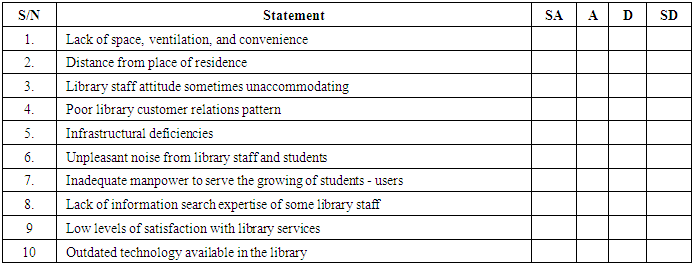 Section C: New practices to encourage library patronageInstruction: Please indicate the perception on the by ticking in the appropriate box using the key; strongly agree (SA) = 4, agree (A) = 3, disagree (D) = 2, and strongly disagree (SD) = 1.
Section C: New practices to encourage library patronageInstruction: Please indicate the perception on the by ticking in the appropriate box using the key; strongly agree (SA) = 4, agree (A) = 3, disagree (D) = 2, and strongly disagree (SD) = 1.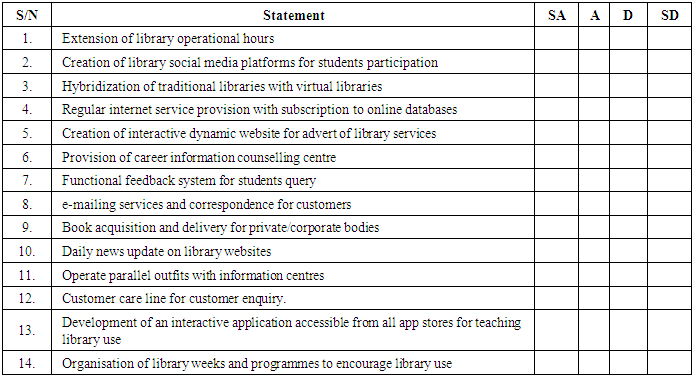 SECTION D: The relevance of these essential approaches to academic librariesPlease indicate the extent to which you agree or disagree with the following statements by a tick in the appropriate box using the keys; strongly agree (SA) = 4, agree (A) = 3, disagree (D) = 2, strongly disagree (SD) = 1
SECTION D: The relevance of these essential approaches to academic librariesPlease indicate the extent to which you agree or disagree with the following statements by a tick in the appropriate box using the keys; strongly agree (SA) = 4, agree (A) = 3, disagree (D) = 2, strongly disagree (SD) = 1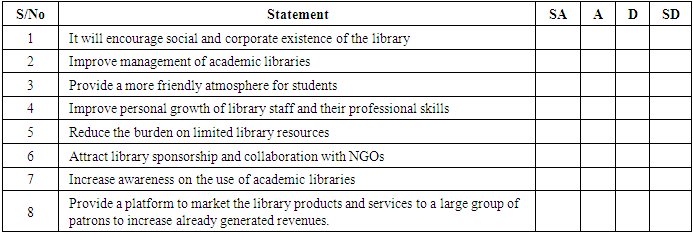 SECTION E: the extent these new adoptable services and approaches can impact the use of libraryInstruction: Please indicate the perception on the by ticking in the appropriate box using the key; strongly agree (SA) = 4, agree (A) = 3, disagree (D) = 2, and strongly disagree (SD) = 1.
SECTION E: the extent these new adoptable services and approaches can impact the use of libraryInstruction: Please indicate the perception on the by ticking in the appropriate box using the key; strongly agree (SA) = 4, agree (A) = 3, disagree (D) = 2, and strongly disagree (SD) = 1.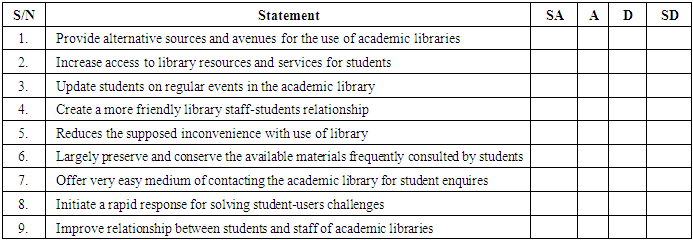
 Abstract
Abstract Reference
Reference Full-Text PDF
Full-Text PDF Full-text HTML
Full-text HTML